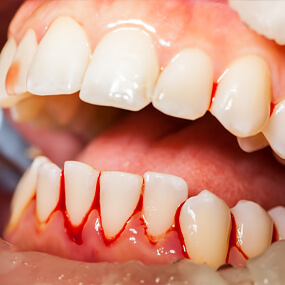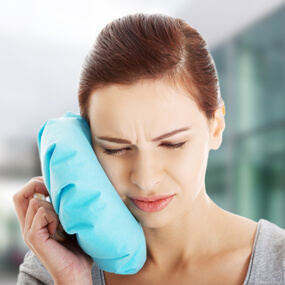The Connection Between Your Physical Health and Oral Health

While medicine has long recognized a link between your overall and oral health, recent research has suggested a much deeper connection than originally theorized. Gum disease, for instance, is now often linked to cardiovascular diseases, kidney diseases, respiratory infections, and even degradation of cognitive abilities. But this is most certainly a two-way street, and a compromised immune system and poor health in other areas of your body can negatively shape your oral health as well.
Asthma
People with asthma must often manage it with a rescue inhaler. The downside to such inhalers is that they dry out the mouth and make people more prone to cavities. In fact, people with asthma are affected by cavities at a higher rate than people who do not have asthma. Persistent dry mouth can also make you more prone to gum infections, and so, people with asthma must be vigilant about hydration.
Coughing is another way that asthma negatively affects oral health. Asthma attacks are often accompanied by coughing fits, which can lead to acid reflux. Acid comes up through the esophagus and into the mouth, and if this happens on a regular basis, that acid will erode the tooth enamel. People with asthma should aim to neutralize the pH levels in their mouths and rinse regularly.
Diabetes
Diabetes can have a devasting effect on the human body: eyesight, heart, kidneys, and even your teeth and gums. The disease makes you much more prone to periodontitis—advanced gum disease—and this can create a nasty cycle since gum disease destabilizes blood sugar levels because it makes processing insulin more difficult, and so the diabetes becomes much more difficult to control.
Dentists are often the first to diagnose diabetes due to gum bleeding, receding gums, dry mouth, and other oral symptoms. A dry mouth means that saliva is not washing away food particles, bacteria, acids, and so forth, which makes you more prone to cavities. These issues are compounded because people with diabetes do not heal as well and so minor health issues linger and become more serious.
Osteoporosis
Osteoporosis is a disease that weakens the bones and puts a person at great risk of fractures and breaks. It is much more common in women. A study published in the Archives of Osteoporosis estimates that as many as 38 percent of women in the developed world are affected, whereas only 8 percent of men in those same countries have the disease. Osteoporosis is most often associated with the hip bone because such injuries can be devastating, but the disease can affect the jawbone as well. This can contribute to advanced gum disease, tooth loss, and ill-fitting dentures. In fact, women with osteoporosis are three times more likely to suffer from tooth loss. Starting with menopause, women need to manage their calcium intake and be examined by a doctor on a regular basis.
Stress
Stress may be a fact of life, but it can have serious repercussions if you do not manage it well. Stressed people tend to clench their jaws, putting undue pressure on their teeth. It is not unusual for such people to develop sleep bruxism, which is grinding of the teeth while sleeping. People with untreated anxiety disorders are particularly prone to stress manifesting physical symptoms such as these.
Substance Abuse
The term substance abuse is often associated with narcotics, but even people who regularly smoke cigarettes and drink alcohol make themselves more prone to oral health issues. Smoking is quite devastating, and gum disease and tooth loss are much more common among smokers. Certain narcotics, such as methamphetamine, can devastate the gums and teeth as well. In fact, the term meth mouth came about due to how devastating regular meth use can be to oral health.
Healthy Lifestyle Choices
Poor overall health is often an accumulation of small but unhealthy lifestyle choices. Those choices affect your general health and your oral health, and such issues often feed into one another. Most people do not need wholesale changes but rather small tweaks here and there.
- Balance your diet. Make healthier food choices. Emphasize unprocessed foods in your meal choices: vegetables, fruits, whole grains, legumes, nuts, and so forth. Ensure that you are reaching the recommended daily allowance for important nutrients, including the mouth-friendly ones.
- Opt for organic and GMO-free food options, which limits your intake of harmful chemicals.
- Eat smaller portions and perhaps even less often. Many people have embraced intermittent fasting because it gives them more flat energy and makes it easier to maintain an ideal weight.
- Stay hydrated. Get a metal spill-proof water bottle that you can have on you at all times. Consider a reverse osmosis filter for water at home that tastes great and is inexpensive over the long-term.
- Get a good night’s sleep every night. Most people do not get enough rest, and surveys have indicated that average adults think they need a lot less than they actually do.
- Exercise on a daily basis. There is no better way to manage stress than a workout. It also increases lifespan, lowers your risk of cardiovascular disease, aids with digestion, and much more.
- Keep things interesting. Rather than ride the same exercise bike every day, engage different parts of your body with yoga, hiking, swimming, tennis, or whatever else interests you.
- Relax, which is another great way to manage stress. Meditate, or find a method that works for you. Consider deep breathing techniques. Practice makes diaphragmatic breathing more natural over time and can help you get more oxygen into your lungs on a consistent basis.
- Evaluate your posture. Correct it as needed. If you are often deskbound, evaluate the ergonomics of your setup and adjust it as required. This is essential to avoiding repetitive stress injuries, and you may be amazed at just how much better you feel on a regular basis with good posture.
- Be positive. Happiness really is a choice. Avoid negative internal dialogue. Remove negative people from your life. Seek help if you experience depression or other mental health issues.
- Live life with a purpose. Live where you are happy rather than where you are. Never stop learning. Set goals for yourself, and continue striving toward them.
- Leave shoes outside. It is advisable that everyone remove their shoes before entering the house. Shoes are a hotbed for germs and disease-causing bacteria.
- Use a HEPA-filtered air purifier. HEPA captures allergens and other harmful contaminants while ensuring clean indoor air. Make sure to invest in a unit from a reputable manufacturer such as Amaircare or Airpura.
- Thoroughly vacuum your home every week. A HEPA-filtered vacuum, such as a Miele, ensures that up to 99.97% of all particles down to 0.3 microns in size are removed from your living environment.
- Consistent oral care is essential to a positive lifestyle. Brush your teeth twice a day. Scrape your tongue when you brush, and floss your teeth and gums on a daily basis. It is also imperative that you see your dentist proactively rather than as a reaction to specific oral health issues.
Focus on the big picture. It may not be obvious how a bad lifestyle choice here or there affects our oral health or our systemic health, but those choices certainly add up and catch up to us. That is not to say you should not treat yourself. Rewarding yourself is important too, but it should be done within the context of a behavioral pattern that is sustainable and beneficial to your mind, body, and spirit.
Approach Your Oral Care From a Total Health Perspective
Modern medicine urges us to consider our mouth within the context of the whole. Just as you should take care of your teeth and gums to protect your body overall, you should aim for a healthy lifestyle that ensures healthy teeth and gums throughout a long life. Jeffrey D. Clark, DDS, is a leading dentist in Arizona who appreciates this connection and works with patients to find this balance. If you have any questions or would like to schedule an appointment, call Scottsdale Cosmetic Dentistry Excellence at 480 585 1853.




